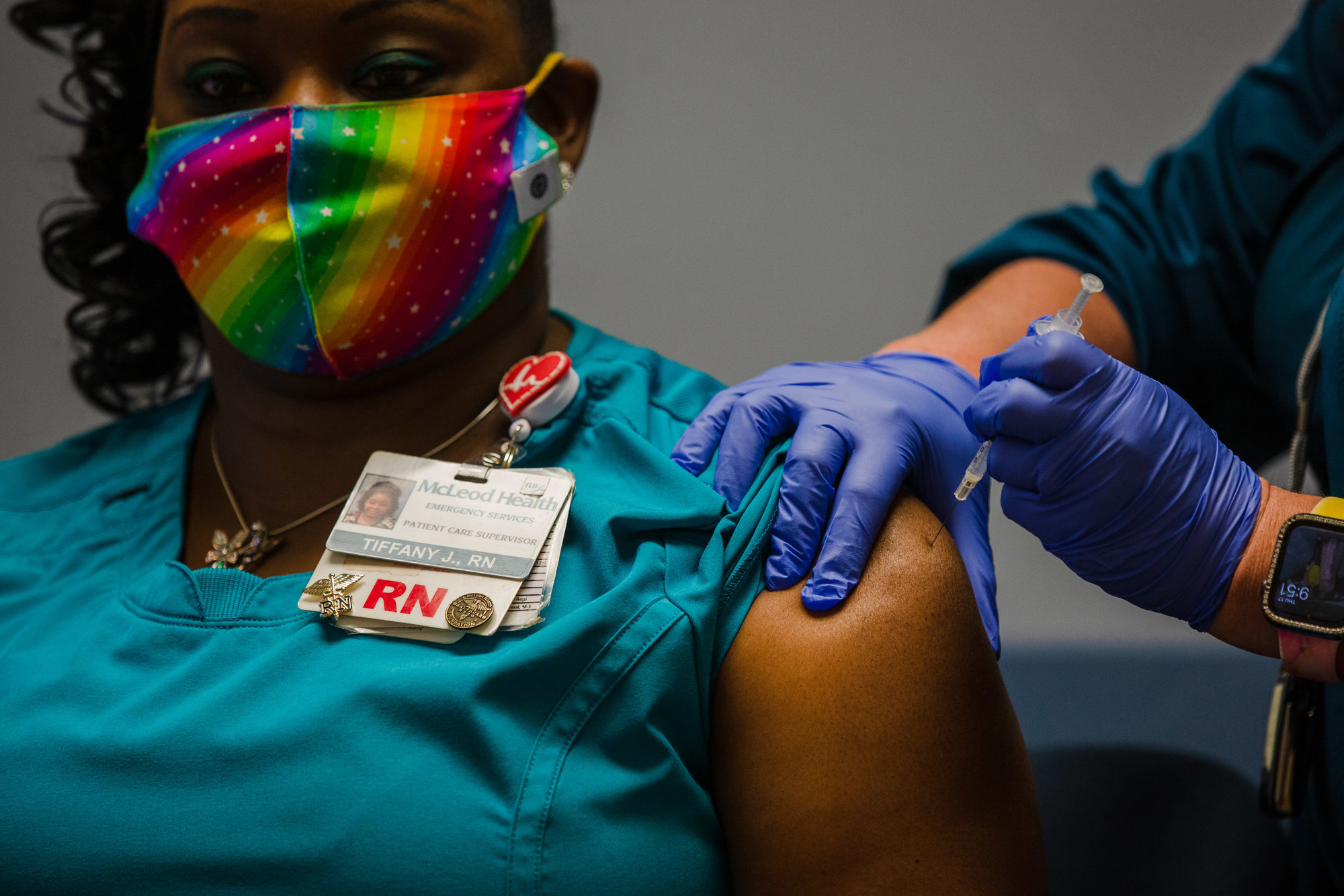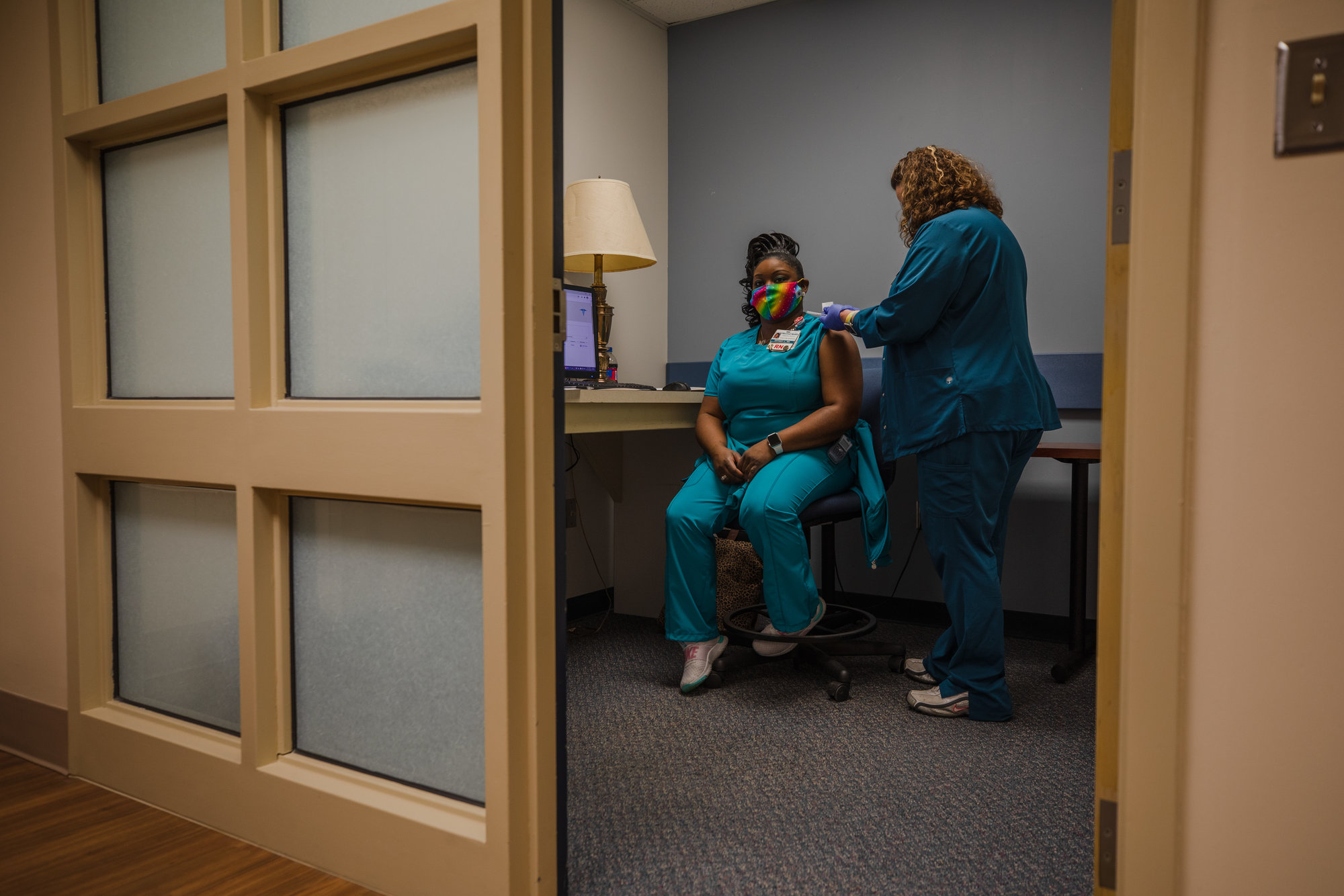While some in Black, Latinx communities are skeptical, local leaders encourage virus vaccination
McLeod Health Clarendon CMO says most of staff has received vaccine, trust its effectiveness
42,900
Doses of the Pfizer-BioNTech vaccine South Carolina received in its first allocation Dec. 14-16.
19,644
Doses administered to Phase 1a individuals as of Dec. 22. Shots are continuing to be administered daily.
15
Health care facilities receiving a combined 30,255 doses of the vaccine in the state's second round this week. The state remains in Phase 1a
21
Days after the first Pfizer shot is administered for a person to be ready for the second shot.
Dec. 28
The week CVS and Walgreens will begin vaccinating long-term care facilities in South Carolina with Moderna. All Moderna vaccines made available to the state will be allocated to the CDC's federal Long-Term Care Program, which works with the pharmacies to provide vaccinations to the state's long-term care facilities. Skilled nursing facilities will be the first to be vaccinated through the federal program, according to Dr. Brannon Traxler, interim public health director for DHEC.
Dec. 20
When federal guidance was released about vaccination recommendations for Phase 1b individuals. South Carolina's Vaccine Advisory Committee will follow the federal guidance.
200,000-300,000
Doses South Carolina is expected to receive by the end of the year.
Who is included in Phase 1a?
Phase 1 is being divided into two sub-phases: Phase 1a and 1b.
The purpose of Phase 1a is to avert death.
Phase 1a includes staff and residents of nursing homes and long-term care facilities and people serving in health care settings, such as people working directly with COVID-19 patients; ancillary staff interacting with COVID-19 patients; emergency room staff; medical first responders; hospital transport personnel; corrections staff; home health workers; coroners; and other front-line medical workers.
Hospitals are receiving vaccinations in the first weeks of Phase 1a, followed by enrolled and approved providers. Do not contact hospitals to be vaccinated. DHEC will contact those included in the groups identified as eligible.
Source: DHEC
kareem@theitem.com
Tiffany Monroe said she and her children don't trust getting the COVID-19 vaccine anytime soon.
"It seems like it's an experiment, and I don't want anybody to experiment on me," said Monroe, a Black woman who lives in Summerton. "I probably won't take it until I get to the point where I'm comfortable and see if it's safe or if it's just mandatory."
Monroe and other people of color have expressed a level of hesitancy in taking the COVID-19 vaccine, which some attribute to the historic legacy of the government's mistreatment of communities of color. In the Black community, many remember the Tuskegee Syphilis Study from the 1930s when government doctors conducted experiments on Black men by leaving many of them untreated for syphilis so doctors could monitor how the disease affected them. The experiment was ultimately exposed and ended in the early 1970s.
This 40-year-long experiment - and other unethical practices - has left many in minority communities distrustful of taking medical advice from the government.
The pandemic has continued to disproportionately affect both Black and Latinx communities, with many becoming seriously ill from the virus or knowing someone who has been hospitalized or died. In South Carolina, while the state population is 27% Black, 39% of the COVID-19 patients who have been hospitalized have been Black, and 31% of the state's deaths have been Black South Carolinians, according to data current as of Dec. 20, numbers that fluctuate but paint a similar picture.
Several polls have revealed the ambivalence surrounding the vaccine among both Black and Latinx populations.
According to a study released by COVID Collaborative, the NAACP and UnidosUS, only 14% of Black Americans trust a vaccine will be safe, and 18% trust in its effectiveness. For Latinx Americans, the number is slightly higher, as 34% believe the vaccine's safety and 40% believe its effectiveness.
With Pfizer-BioNTech already rolling out to health care workers and Moderna's vaccine being distributed to long-term care facilities in the next few weeks, public health officials are making efforts to encourage a positive image of getting vaccinated, especially among rural residents.
Rural communities have faced challenges in preventing, diagnosing and treating the coronavirus since the beginning of the pandemic because of a lack of access to medical care and reliable information in addition to the lasting memories that have seeded mistrust.
Dr. Catherine Rabon, chief medical officer at McLeod Health Clarendon, received the first dose of the Pfizer vaccine at the Manning hospital along with most of her staff last week. She encouraged others to trust the process of the vaccine's effectiveness. She and other officials have heard skepticism about the vaccines because of the lack of reliable information circulating in communities.
In Clarendon County, a community with a single hospital, while Black residents make up nearly 49% of the population, they also make up 54% of coronavirus-related deaths in the county.
Sumter County's residents are split evenly at 48% Black and white, but African-Americans make up 45% of COVID-19-related deaths while only 34% have been in Sumterites who are white.
In Lee County, the county is 64% Black but has seen African-Americans comprising 71% of its COVID-19 deaths.
A parade of officials - from Morris College President Dr. Leroy Staggers to state Sen. Kevin Johnson, D-Manning, to Sumter NAACP President Elizabeth Kilgore - said they will get their vaccine when it becomes available to them.
"I would get it," Kilgore said. "I would take the vaccine if it's going to prevent me from getting COVID for my health."
All of them said that if more leaders and people of color advocate for the vaccine, it would lead to a better response that will prove pivotal in slowing the spread of the coronavirus.
Johnson, who represents Clarendon County and parts of Sumter County, understands residents' distrust of medical advice and care - rooted in a history of mistreatment toward Black people - but said they should trust the science behind these vaccines to slow the spread of the virus so we can all return to a sense of normalcy, hopefully by next summer.
"I understand some of the hesitancy, but I feel it is safe," Johnson said. "I just encourage everyone to get vaccinated."
More Articles to Read




